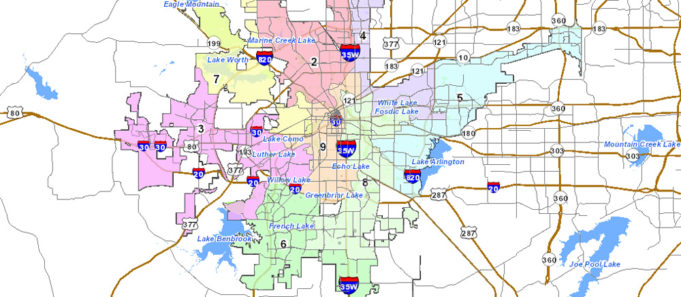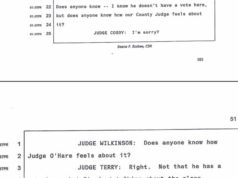Representative government should (in theory) be just that — a governing body that proportionately reflects the race, gender, and beliefs of constituents. Three-fifths of the Tarrant County Commissioners Court are white men. Only one commissioner, Devan Allen, is female, and not one commissioner represents the Latinx community.
Fort Worth does marginally better. Three of eight city councilmembers (plus the mayor, who is a voting member of the city council) are female, but Fort Worth leadership remains decidedly white with one Hispanic and two Black councilmembers, even though the non-Hispanic white population in Cowtown accounts for only 39.4% of the total local population, according to the city.
The lopsided overrepresentation of white elected officials in local government is due in no small part to the lucrative campaign donations afforded conservative candidates in Texas and the ability of wealthy white men and women to use these monies to gain seats of power. Those realities are not changing anytime soon, but the playing field can be somewhat evened when city, county, and state districts allow historically marginalized voting blocs (Hispanic, Black) to elect officials who represent the interests of those communities.
Democrats and Republicans have long used gerrymandering to isolate or break up pockets of political opposition. The idea is to dilute the political influence of your opponents by redistricting electoral lines to ensure that those in power carry a majority of votes. Texas has been found in violation of the 1965 Voting Rights Act every decade since the enactment of that law, and those violations have served the interests of white candidates. A whopping 95% of Republican state legislators identify as white/non-Latino, according to the Texas Observer.
Given Texas’ penchant for whitewashing elections, Fort Worth’s ongoing redistricting efforts have been met with both skepticism and cautious optimism. The redrawing of city council districts will coincide with an expansion of Fort Worth City Council from nine to 11 members (including the mayor). Locals approved the expansion when they voted for an amendment to the city charter in 2016. A growing population requires an expanded city council, voters were told at the time. The additional city council seats and revamped district will be enacted once the 2020 Census figures are known, according to the city.
Last week, the city council-appointed 11-member Redistricting Task Force released its interim report. As the process moves forward, the task force said its top priorities will be to create districts of “approximately equal size” that “should be no more than 10% greater than the population of the smallest district.” The redistricting efforts should be completed in compliance with the Voting Rights Act and with “no packing of minority voters, no fragmentation of minority communities, and no retrogression in the ability of minorities to participate in the electoral process.”
The task force said it will work to ensure that districts represent “communities of interest.”
Groups like Citizens for Independent Redistricting (CitizensMapFW.org) would like to see locals given the power to draw their own future.
“Do you believe elected leaders can draw the boundaries of our municipal districts free from any temptation to gerrymander safe seats for themselves?” the group posits on its website.
Fort Worth took significant steps toward transparency and open government when city leaders created a participatory budgeting process this year that included virtual town halls and meaningful opportunities for locals to voice their views on how tax dollars are spent.
For the final recommendations of the Redistricting Task Force to be seen as legitimate, locals need to know that their input was incorporated — not simply listened to. A “virtual redistricting 101 seminar” will be led by the task force on Mon, Jan 4. For details on how to participate, email city secretary Mary Kayser at mary.kayser@fortworthtexas.gov or call 817-392-6150. The final report will be presented to city council on Tue, Mar 2.
The Weekly welcomes submissions from all political persuasions. Please email Editor Anthony Mariani at anthony@fwweekly.com.













I would like to suggest that the Citizens for Independent Redistricting include in their
plans the number of illegal aliens living in Tarrant County. The non-citizens should not be accounted for and not included in numbers for miniority representation in Tarrant Count. The illegal aliens
should be removed from Tarrant County before any type of redistricting is considered.
Bill, take that up with the Founding Fathers. The constitution says count everyone living in the country. You may be surprised to know that non-citizens have constitutional rights and protections. Apparently, representation is one, despite the fact that they cannot vote.
No it does not. For instance you don’t count tourists and consular families. No where in the Constitution does it say to count all peoples.